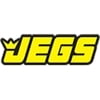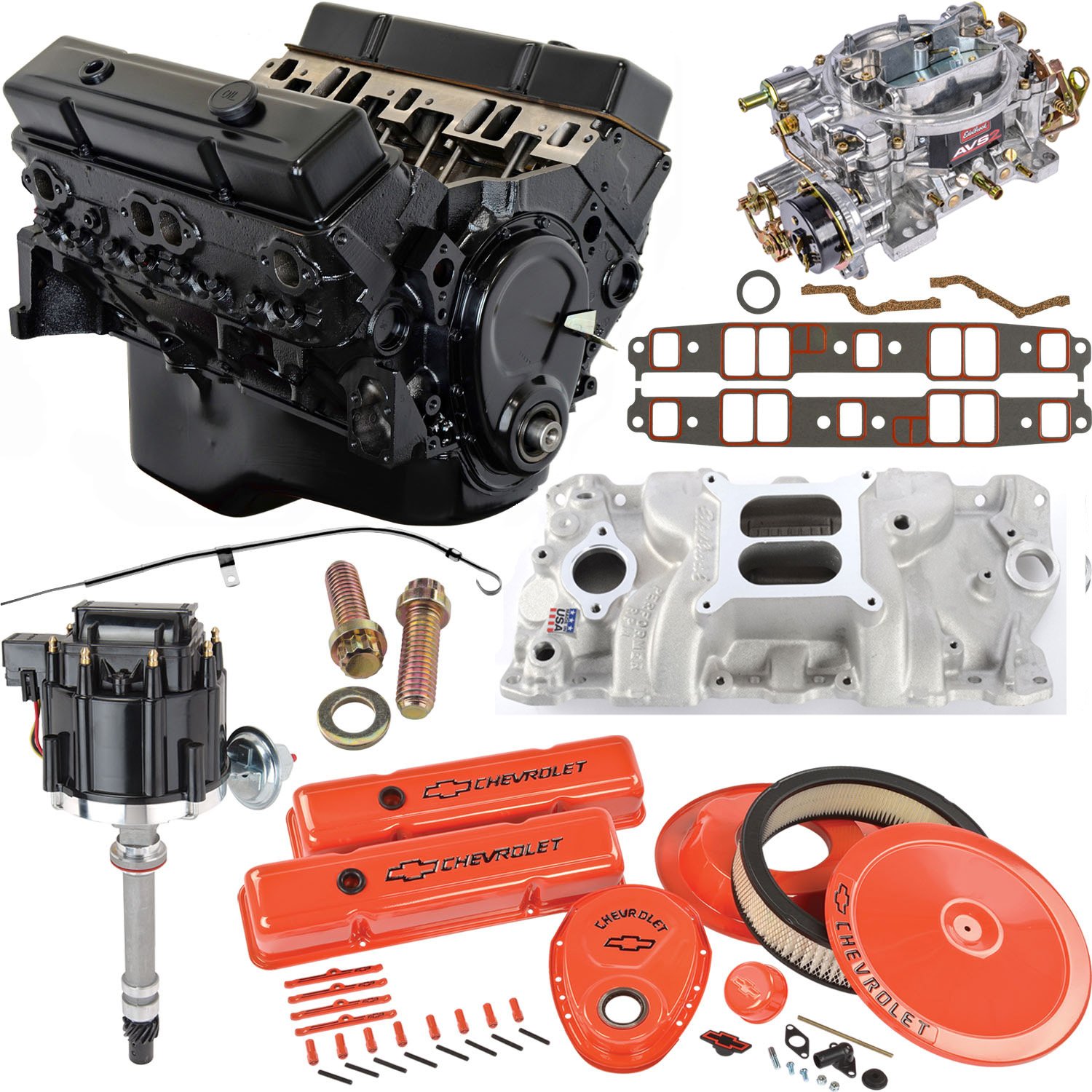Engine Kits
JEGS Small Block Chevy 383 ci Crate Engine Kit Includes:
- JEGS Performance Products Small Block Chevy 383ci Crate Engine - 059-3831
- Edelbrock Performer Intake Manifold - 350-7101
- Edelbrock Performer 650 cfm Electric Choke Carburetor - 350-1906
- JEGS Intake Manifold Gaskets - 555-210004
- JEGS Intake Manifold Bolt Kit - 555-83250
- JEGS HEI Distributor - 555-40002
- Proform Officially Licensed Chevrolet Orange Finish Dress-Up Kit - 778-141-780
- Proform Oil Dipstick & Tube - 778-66130
Engine Specifications
Power Ratings:
- Horsepower: 350 @ 4700 RPM
- Torque: 425 lb/ft @ 3800 RPM
Block Information:
- 1987-1995 seasoned OE block
- 2-bolt main
- 1-piece rear main seal
- Passenger side dipstick
- Displacement: 383 cubic inch
Rotating Assembly:
- Crankshaft: Scat Nodular Iron 3.750 in. Stroke
- Balance: External rear (requires 1987-Up style flexplate or flywheel), internal front
- Rods: Scat 4340 Forged I-beam 5.700 in. Length
- Compression Ratio: 9.6:1
- Pistons: Hyperuetectic
- Rings: Moly
Camshaft Specs:
- Camshaft: Hydraulic flat tappet
- Cam Duration @ .050 in.: Intake 224 / Exhaust 224
- Cam Lift: Intake .466 in. / Exhaust .466 in.
- Lobe Separation Angle: 114
- Timing Chain: Single roller
Cylinder Head Information:
- Cylinder Heads: Pre-1986 cast iron
- Combustion Chamber: 76cc
- Valve Size: 1.940 in. Intake / 1.500 in. Exhaust
- Rocker Arms: Stamped steel 1.5
Oil Pan Information:
- Oil Pan: Black 4 quart
- Oil Pump: Melling standard volume
Long Block Includes
- Short Block
- Camshaft
- Timing Set
- Cylinder Heads
- Valve Covers
- Timing Cover
- Oil Pan
- Oil Pump & Pickup Tube
Notes
- If replacing a pre-1987 (2-piece rear main seal) engine, a new external balance flexplate/flywheel for 1987-Up style engines will be required. This engine will also require a passenger side dipstick (1980-Up vehicles). A driver's side dipstick will not work (Pre-1979). This engine has provisions for a mechanical fuel pump.
- Requires Premium Fuel with 91+ octane
Engine Break-In Procedure
Use or break-in oil or conventional (non-synthetic) 10w30 oil with zinc additive for the first 500 miles of operation. Do not drive for long periods at any single speed, always vary your speed. Do not tow a trailer or put other heavy loads on the vehicle. It is best to avoid long periods of idling during this period. Check the engine oil and coolant levels daily.
Engines with flat tappet hydraulic cams only - Run the engine between 2,000 and 2,500 RPM's, with no-load on the engine for the first 30 minutes. Let the engine cool down completely and repeat the process 2-3 more times. Do not idle the engine for an extended period at this time, this is critical to break-in the camshaft.
At 500 Miles change the engine oil and filter using conventional (non-synthetic) oil with a zinc additive. Check fuel and ignition settings, adjust valves (where applicable). Drive the next 500 miles normally, without high RPM's (below 5000 RPM), hard use, or extended periods of high loading or long periods of idling.
Change the oil and oil filter again at 1,000 miles. Continue using conventional (non-synthetic) oils and zinc additive, until about 4,000 miles. At that point, you may run a quality 10w30 synthetic oil if you choose. The use of oil with zinc or a zinc additive for the life of your engine is recommended.
Specifications:
Will this bolt into a 94 k1500
Will this engine bolt up to a 1989 Chevy c1500 I plan on swapping out my 4.3 for a 383 and will I also be able to keep my 5 speed manual tranny when I do the swap or no
Could you use Tuned port injection?
Motor Vehicles
WARNING: Motor vehicles contain fuel, oils and fluids, battery posts, terminals and related accessories which contain lead and lead compounds and other chemicals known to the State of California to cause cancer, birth defects and other reproductive harm. These chemicals are found in vehicles, vehicle parts and accessories, both new and as replacements. When being serviced, these vehicles generate used oil, waste fluids, grease, fumes and particulates, all known to the State of California to cause cancer, birth defects, and reproductive harm.
Tools:
WARNING: Some dust created by power sanding, sawing, grinding, drilling, and other construction activities contains chemicals known to the State of California to cause cancer and birth defects or other reproductive harm. Some examples of these chemicals are: lead from lead-based paints, crystalline silica from bricks and cement and other masonry products, and arsenic and chromium from chemically treated lumber. Your risk from exposure to these chemicals varies, depending on how often you do this type of work. To reduce your exposure, work in a well-ventilated area and with approved safety equipment, such as dust masks that are specially designed to filter out microscopic particles.
Electrical Cords
WARNING: The wires of these products contain chemicals known to the State of California to cause cancer and birth defects or other reproductive harm. Wash hands after handling.









